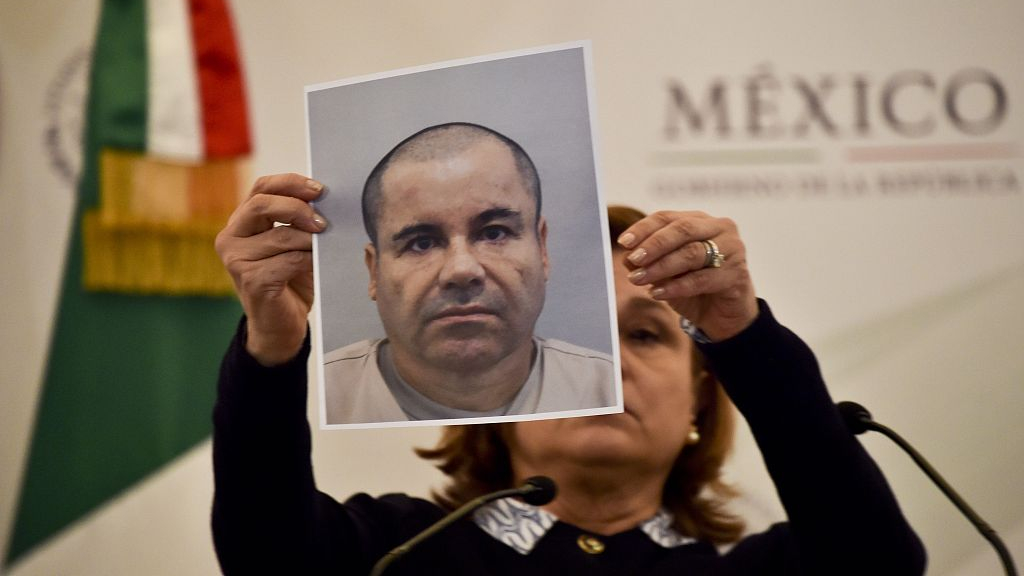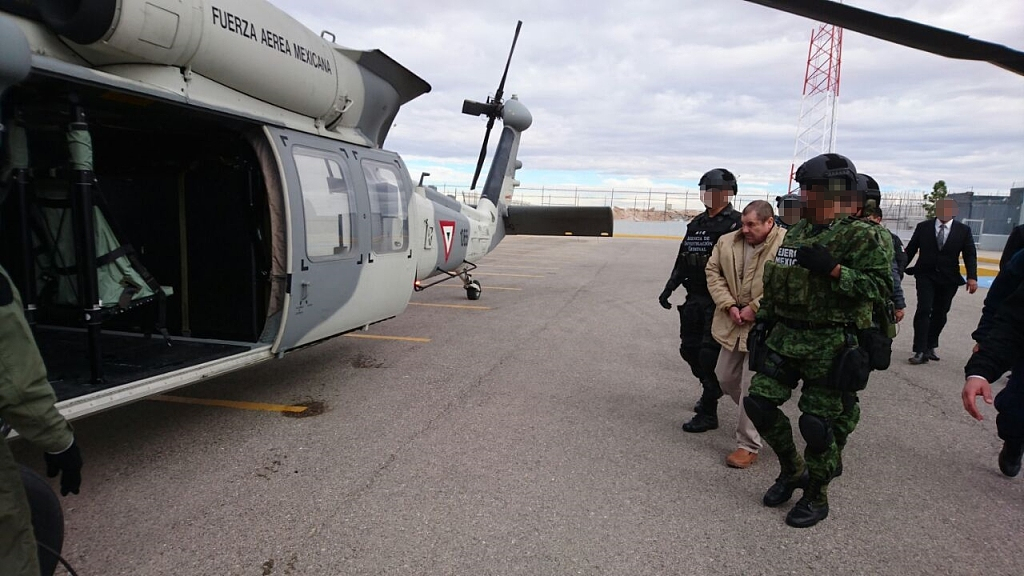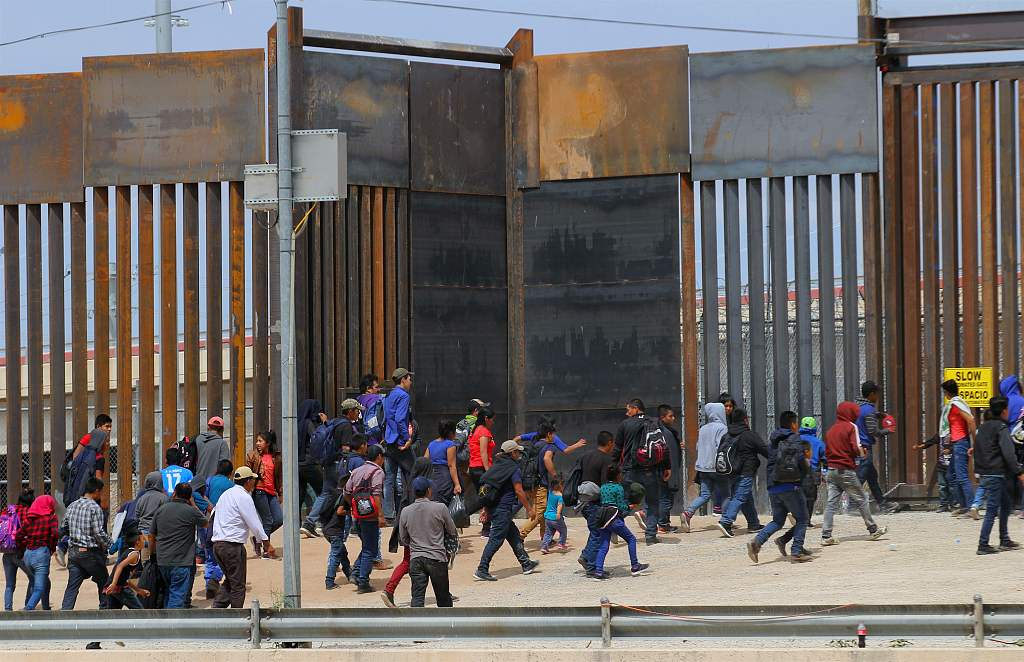

Editor's Note: Tom Fowdy is a British political and international relations analyst and a graduate of Durham and Oxford universities. He writes on topics pertaining to China, the DPRK, Britain, and the United States. The article reflects the author's opinions, and not necessarily the views of CGTN.
Last night a U.S. judge sentenced Joaquín Guzman, or otherwise known as "El Chapo," to life in prison, plus an additional 30 years. Guzman is described as being the most notorious and powerful Mexican drug cartel leader in history. Having an estimated net worth of up to 14 billion U.S. dollars, El Chapo oversaw an empire of organized crime and corruption which ran right throughout the American continent, running it as what some commentators described in the manner of a "Fortune 500" company.
Despite repeated attempts to bring him to justice, El Chapo's ability to bribe authorities, intimidate witnesses, and even escape from custody made him unassailable for many years. However, after Mexican authorities captured him in 2016, he was extradited to the United States the following year, where he faced trial for a number of charges related to his activities. Now, he will spend the rest of his life in a maximum security American prison, which will also have maximum resilience against any form of escape. It is fair to say his fate has finally sealed.
But why of course, does this all matter? What is its political significance? The story and case of El Chapo offer us a great insight into the political, economic, and social problems that have plagued countries in Latin America, as well as the impact that drug cartel activities have had in the United States, which have played an instrumental role in the creation of "Trumpism" and prejudice against Mexicans. Yet this all reveals the stark inequality at play throughout the western hemisphere, and in turn this means his incarceration truly changes nothing.

El Chapo being escorted by Mexican authorities to the United States, January 19, 2017. /VCG Photo
Guzman's early life reveals the circumstances which drive many young men in Latin America into drug cartels: poverty, desperation, and lack of opportunities. Guzman was born into a poor family in the rural Sinaloa province of northern Mexico. Rather than pursuing an education, the young El Chapo was forced to assist in securing his family's day-to-day survival through a number of selling activities, as well as the growing of opium and marijuana. However, he suffered at the hands of his violent and abusive father, which compelled him to leave home. With nothing else going for him in life, by his early 20s he found his way into the world of drug trafficking.
These are the same circumstances throughout Latin America that continue to drive people into these activities today. Seeing the poverty, corruption, and political weakness prevalent throughout Central and South America, El Chapo was able to keep authorities pacified for years as he constructed a machine which saw cocaine produced in Peru and Columbia, and then illicitly smuggled all the way into the country with public demand and capability to pay for it: the United States, a land where struggling Latin Americans' dream of a better life within.
The one way flow of drugs and people has created a negative sentiment within the United States. Increasingly, the work of El Chapo and his rivals made Americans begin to stereotype Mexico and Latin American countries as a source of organized crime, illegal immigration and drugs. In 2015, these feelings broke into the mainstream in the form of Donald Trump, as he weaponized populism against Mexico by accusing them of "bringing drugs" and demanding a "wall" be built across the border, playing upon people's fears of a changing demographic.

Central American people arriving at the U.S.-Mexico border in Ciudad Juarez, Chihuahua state, Mexico, May 7, 2019. /VCG Photo
What does this all teach us? It teaches us that ultimately there is a deep and growing inequality between two sets of people. The United States is prosperous. And the countries beneath it, which have often been subject to political instability and crises through Washington's centuries-old objective of maintaining undisputed dominance over the western hemisphere, are not. While it is easy to condemn El Chapo for his ruthless criminal activities, it is important to look at the bigger picture as to how poor and frustrating life circumstances create criminal activities. As much as Guzman is a notorious figure, his life did not orchestrate itself within a vacuum or within extraordinary circumstances. Rather, he is a direct product of his environment.
In this light, while his prosecution and sentencing may be a victory for American prosecutors and the rule of law, in reality it changes little about the problem of drug cartels. The void El Chapo leaves will be filled by someone else, as poverty, inequality, and scarce life opportunities continue to plague Latin America. In turn, the hard-line policies of the Trump administration and his pursuance of a "wall" will also fail to stop the rise of future El Chapos.
(If you want to contribute and have specific expertise, please contact us at opinions@cgtn.com.)

Copyright © 2018 CGTN. Beijing ICP prepared NO.16065310-3
Copyright © 2018 CGTN. Beijing ICP prepared NO.16065310-3